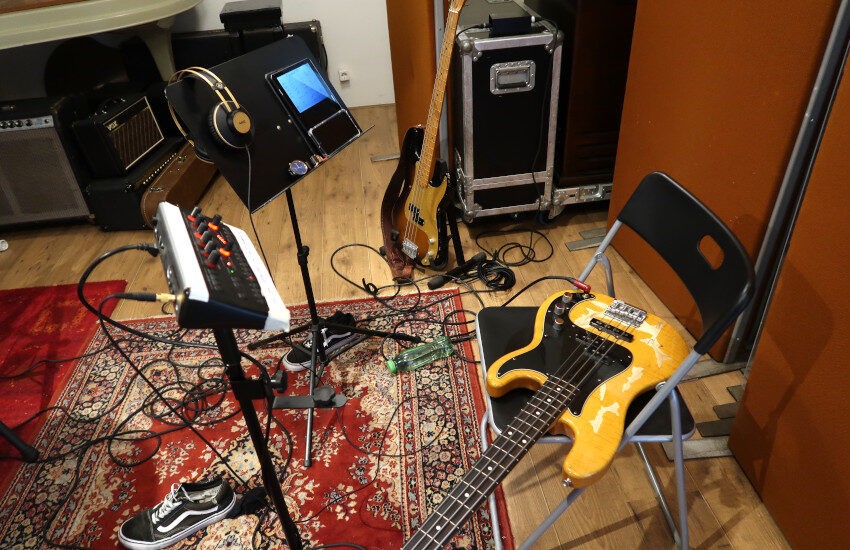A lot of bass players reach a point where they feel they are stuck and don’t know how they can evolve into a better bass player. “I’m stuck with my bass playing, what should I practice next?”. That’s a common question I hear from my students. There really is no one-size-fits-all answer to that question. There is a solution that works for everyone though!
Music is a journey. Like any journey, you should definitely drive around and do some sightseeing (trying out different things on your bass as you encounter them) but you should also have some idea of where you want to go. You don’t want to stand by the side of the road wondering where you should drive next.
Musical goals
Deciding what you’re working towards depends on your musical goals. Do you want to be a bass player for musicals? Are you dreaming to be the best slap bass player in your country? Do you want to be just like Jaco Pastorius? Or do you just enjoy playing some bass with your friends in the weekends?
Every goal is just fine, but every goal needs a different set of skills. If you want to make it in the world of musicals, you have to be really good at reading music. If you just play with your friends on the weekends however, this is not an essential skill.
Who are your heroes
Bass playing is not something that is the same for everyone. We have soloists, pocket guys, shredders, players with a less-is-more approach and even players with a more-is-more-approach. To determine what you need to learn depends on what you like about bass playing or which bass player you aspire to be like. For example, do you like Pino Palladino? Keep in mind Pino:
- …has an amazing groove.
- …has a wonderful tone, as well on this precision bass as when he plays on his fretless Musicman bass.
- …plays beautiful groovy and melodic lines.
- …doesn’t read music, so he probably has amazing ears and instincts.
- …has amazing timing.
If you want to be more like Pino, you should make sure you can check off all the boxes above. Assignment: Make a list of every trait or skill you would like to have or improve on.
Converting traits into goals
Converting these traits into goals is the next step. If you’ve made your assignment and realize that your ears are not as good as you’d like them to be, and you mostly rely on bass tablature for learning songs, one of your goals might be to work on your musical hearing.
This is still a vague goal (what does working on your musical hearing mean?!). You’d be wise to take this big goal and make a list of smaller measurable goals that will help you reach this bigger goal. For example:
- Be able to recognize any interval from the minor 2nd up to the octave
- Transcribe 3 songs every week using just your ears
- Being able to recognize familiar chord progressions
- Being able to recognize whether a chord is major or minor
By setting measurable goals, you can determine if you have reached them or not. If you did, congratulations! You have come one step closer to reaching your potential. Now it’s time to aim even higher and set new goals!
Realizing what your weaknesses are
One other thing to determine a goal, is to really zoom in on your own bass playing. Record yourself, what do you like about your playing, what don’t you like? Are you really locking in with the drummer? Do your basslines sound creative? Are your notes sounding even? Is your playing groovy? Be critical about your playing. You can even ask friends or band mates what they think you can improve on. If you hear things about your bass playing that you don’t like, add them to your list of traits/skills.
Get inspired by others
Another way to find new goals in your bass playing, is to just listen to a lot of music. Check out Spotify playlists with your favorite genres, visit concerts of bands you really like. There is a big chance you will hear stuff that you really enjoy. And it doesn’t even have to be another bass player. Maybe you just hear an amazing saxophone solo that rocks your world. Maybe you hear a trombone player killing it. Inspiration is everywhere. Write down what inspires you about the musician and define goals that help you reach their level.
Evaluate your list
People change during their lifetime. There will probably be some shifts in beliefs, interests, goals and many other things. As bass players this also happens. You learn to appreciate other music genres, playing techniques and musical philosophies. This will also influence how you (want to) play bass.
Evaluate your lists of traits/skills on a regular basis. You might realize some changes in the things you want to achieve over time. This is no problem. Just make sure you steer yourself in the right direction.
To summarize
What you should practice next has everything to do with what you want your bass playing to be like. If you have a certain longtime goal in mind, you can break it up into smaller goals, and even smaller goals. By making your goals measurable you create a checklist of things to work on.
Determine your longtime/big goals by being critical on your bass playing, asking band mates/your teacher what they like and dislike about your playing and by getting inspired by all the music you take in. Be sure to evaluate your goals from time to time so you don’t lose sight of what is important to you and your bass playing.
I hope you found this article helpful! Let me know in the comments what your thoughts are and if you have any questions or suggestions.
If you enjoyed this article you might also like Should you take bass lessons?

